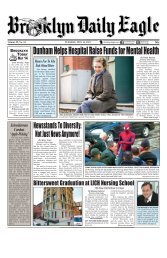May 2 2013 Thu BDE.pdf - Brooklyn Daily Eagle
May 2 2013 Thu BDE.pdf - Brooklyn Daily Eagle
May 2 2013 Thu BDE.pdf - Brooklyn Daily Eagle
You also want an ePaper? Increase the reach of your titles
YUMPU automatically turns print PDFs into web optimized ePapers that Google loves.
Views on Aging, from A Longtime, Expert Observer<br />
Age is an issue of mind over matter. If you<br />
don’t mind, it doesn’t matter. – Mark Twain<br />
By Ciril J. Godec, MD<br />
Chief, Department of Urology<br />
Professor of Urology,<br />
Downstate Medical Center<br />
At Long Island College Hospital<br />
Getting older is inevitable, growing<br />
up less so. Ask my wife; she will<br />
tell you immediately that growing up<br />
and maturity do not apply to me. What<br />
is aging? Of the many definitions, I’ll<br />
mention just two. “The process of<br />
growing old and mature.” Or, a more<br />
biological definition, “aging is the endogenous<br />
and hereditary process of accumulative<br />
changes of molecular and<br />
cellular structures disrupting metabolism<br />
with the passage of time, resulting<br />
in deterioration and death. Aging<br />
occurs on both levels, of the whole organism<br />
as well as of individual cells”.<br />
Aging is, by far, the leading cause<br />
of death. Of the approximately 150,000<br />
people who die each day, roughly<br />
100,000 die of aging. In developed countries,<br />
up to 90% of deaths are due to aging.<br />
In 2012, the average lifespan for the<br />
U.S. was 78.49 years and for the world<br />
was 67.59. Still, for longevity, the U.S.<br />
ranks only fiftieth among the countries<br />
in the world. The first is Monaco with<br />
89.68 years, and at the bottom is Chad<br />
with 49.<br />
At the present time, the maximum<br />
lifespan for humans is approximately<br />
120 years. The oldest documented<br />
human being was Jeanne Calment, a<br />
Frenchwoman who died in 1997 at the<br />
age of 122 years and 164 days. Centenarians<br />
are currently the fastest growing<br />
segment of the American population.<br />
While they number 70,000<br />
in 2012, the American Census Bu-<br />
reau predicts that in 2050 we’ll have<br />
600,000 in the US. Among centenarians,<br />
women are at a distinct advantage:<br />
85% of centenarians are women.<br />
But if men can make it past 100,<br />
they are in general in better health.<br />
Not everybody will get Alzheimer in<br />
very old age; only one third of centenarians<br />
have it, one third have some<br />
hearing and vision impairment (they<br />
might appear Alzheimerish, but they<br />
are not) and one third are completely<br />
normal and functional.<br />
Is aging really a universal principle<br />
in nature? <strong>May</strong>be not. We know that<br />
most animals don’t die of aging. They<br />
are eaten or killed by other animals or<br />
humans. There are some animal species,<br />
like jellyfish, that never die. Some<br />
whales and turtles can survive over<br />
200 years. Many trees can survive over<br />
thousands of years.<br />
In 2011, heart disease and cancer<br />
were the two leading causes of death<br />
in the U.S.: 590,000 for heart and<br />
570,000 for cancer. Alzheimer was in<br />
sixth place, with 83,000 deaths. All<br />
three diseases are age-related; the older<br />
we get, the more of these three diseases<br />
we get. Heart and Alzheimer disease<br />
increase steadily with age, but<br />
cancer is different. Up to age 90, the<br />
incidence of cancer is growing, but<br />
after 90, it starts to dip. If we look at<br />
death certificates of centenarians, we<br />
discover that most centenarians die of<br />
either heart failure or Alzheimer’s disease<br />
and very seldom of cancer.<br />
What is the reason? In general, our<br />
immune system protects us against<br />
cancer and many other diseases, but<br />
with age, the immune system becomes<br />
weaker. Some studies suggest that the<br />
immune system in the very old is different.<br />
In advanced age, instead of<br />
8 • IN<strong>Brooklyn</strong> – Section of <strong>Brooklyn</strong> <strong>Daily</strong> <strong>Eagle</strong>/ <strong>Brooklyn</strong> <strong>Eagle</strong>/<strong>Brooklyn</strong> Heights Press • <strong>May</strong> 2, <strong>2013</strong><br />
progressively deteriorating, it reorganizes,<br />
and in many centenarians,<br />
it is actually augmenting. Centenarians<br />
seem to be immunologic<br />
outliers. We do not know<br />
the precise mechanism of<br />
this phenomenon. Do some<br />
epigenetic switches get activated<br />
to protect the very<br />
old? Do very old people become<br />
more resistant to mutations?<br />
Most diseases are more<br />
connect to lifestyle than to<br />
our genes: 80% is lifestyle,<br />
only 20% is genes. We cannot<br />
change our genes, but they can<br />
be switched on or off with our<br />
lifestyle. We are no longer powerless<br />
when facing chronic diseases<br />
of older age. From some animal<br />
studies, we have learned that<br />
activating or silencing just<br />
a few genes can significantly<br />
extend lifespan<br />
or protect us against<br />
certain diseases. Recent<br />
studies of the<br />
human epigenome<br />
support the direct<br />
impact of lifestyle<br />
on our health. Once<br />
the National Epigenome<br />
Project is<br />
finished, we might<br />
be able to significantly<br />
extend the<br />
human lifespan.<br />
The way we live<br />
matters the most.<br />
A healthy lifestyle<br />
can be achieved<br />
by following a<br />
few basic principles:nonsmoking,<br />
good nutrition, daily exercise,<br />
seven to eight hours of sleep, being socially<br />
connected with friends, family<br />
and community. Spirituality matters:<br />
there is a biological value in prayer, no<br />
matter what your religion. If you are a<br />
non-believer, try meditation; it has the<br />
same biological value as prayer. Also,<br />
remaining active, at work or in retirement,<br />
helps to decelerate the aging<br />
process. Indeed, achieving old age is<br />
like a pedaling the bicycle: if you stop<br />
pedaling, you’ll fall. Do not forget: life<br />
is a verb, not a noun.<br />
What should we eat and how physically<br />
active should we be? Nutrition<br />
first: eat lots of vegetables, fruits and<br />
fish (except talapia, which has too<br />
many omega 6 fatty acids). You don’t<br />
need to be vegetarian; you still can<br />
eat meat but in moderation. Reduce<br />
your salt and fat intake (potato chips,<br />
nachos, fritos). Stay away from processed<br />
food, such as bologna. Drink<br />
lots of fluids, especially water, tea<br />
(green or black), coffee, and red wine<br />
in moderation. Do not take vitamin<br />
supplements, especially the three vitamins<br />
A, C and E. The only vitamin<br />
where we have solid data that supplement<br />
helps is vitamin D. The best vitamin<br />
intake is in well-balanced nutrition.<br />
Eat fruits, but don’t drink fruit<br />
juices – oranges yes, orange juice no.<br />
Fruit juices have about 50% more sugar<br />
than fruits.<br />
Avoid sugary soda drinks. All cancers<br />
are addicted to sugar. In a recent<br />
experiment, researchers compared<br />
cancer cell growth in culture alone<br />
versus culture with added sugar. Cancer<br />
cells grew much faster in the culture<br />
to which sugar had been added.<br />
So, try to limit the amount of sweets<br />
in your life.<br />
Eat slowly. It takes twenty minutes<br />
for the stomach to send a message<br />
to the brain that it is full. If we eat<br />
fast, we can consume lots of food in<br />
those first twenty minutes before we<br />
Ciril J. Godec, MD.<br />
feel that we have eaten enough. Many<br />
fast eaters, mostly men, overeat. Slow<br />
down. Do not eat on the run.<br />
Physical activity, like nutrition,<br />
has numerous health benefits. It<br />
burns calories, prevents obesity, and<br />
reduces coronary disease, stroke,<br />
metabolic syndrome, type 2 diabetes,<br />
and depression. It also significantly<br />
contributes to the prevention<br />
of the four major cancers: colon,<br />
prostate, breast and lung. It also reduces<br />
arthritis and falls. On a physiological<br />
level, it boosts LDH (the<br />
“good cholesterol”), lowers triglicerides,<br />
increases testosterone, and<br />
slows down the shortening of telomeres<br />
at the end of the chromosomes,<br />
which are responsible for our<br />
longevity. If exercise were a pill, everybody<br />
should be on it.<br />
We all would like to live a longer<br />
lifespan, not as mentally and physically<br />
disabled, but fully functional to<br />
the end of our days. We should not<br />
die after months or even years of prolonged<br />
disabilities. In the near future,<br />
we might be able to compress morbidity<br />
to only a few weeks before we die.<br />
Adding years to our lives is important,<br />
but even more important is adding<br />
life to our years. Extending longevity<br />
makes sense only if we can increase<br />
our healthy lifespan. It is no longer<br />
true that the older we get, the sicker<br />
we get. What is more true is that the<br />
older we get, the healthier we have<br />
been.<br />
Until we get epigenetic control<br />
for silencing or activating genes, getting<br />
older will remain hard work. Old<br />
age is no picnic, it is not for sissies.<br />
The number of changes, transitions<br />
and losses may be huge. The longer<br />
we live, the more we lose. We have to<br />
build resilience and be resourceful in<br />
finding healthy ways of coping with<br />
challenges when times get tough. We<br />
should strive to die young but as late<br />
as possible.









